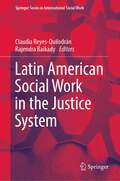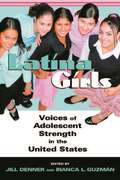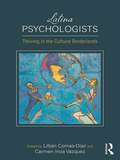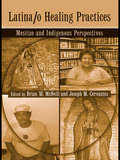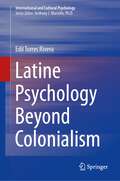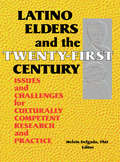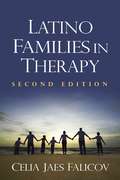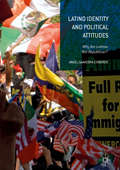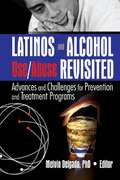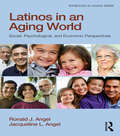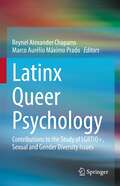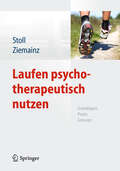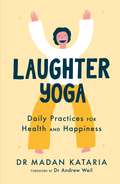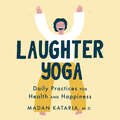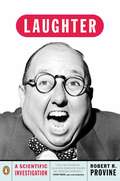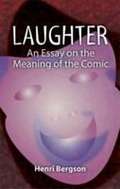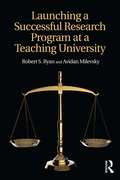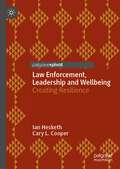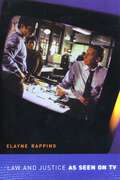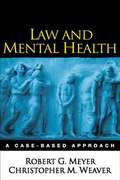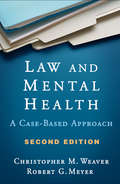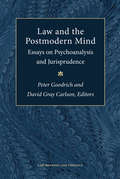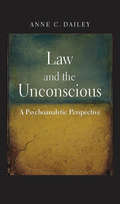- Table View
- List View
Latin American Social Work in the Justice System (Springer Series in International Social Work)
by Rajendra Baikady Claudia Reyes-QuilodránSocial work has long been working directly with the criminal and civil courts of the justice system. The work of Latin American practitioners in the legal system, however, is little known at global and local levels. This book is the first to go beyond Western-centric appraisals and presents a truly Latin American portrait of social work in the justice system. The long-term interaction of social work practitioners with the judicial system enabled them to develop an expertise to dialogue with other disciplines such as law and psychology. This knowledge is very important to identify and share with other professionals to develop specialized programs for education and training. In this sense, positive and negative experiences of social work in the justice system allow one to improve its practice. It is crucial to identify local experiences and the great dilemmas that the profession faces on this subject. The volume's chapters deal with these dynamics in Latin American countries including: Forensic Social Work: The construction of possible ways of the criminal intervention Socio-Legal Social Work in the Field of Criminal Defense Family and Community Life: Contributions of Social Work to the Debate in Family Courts Support to Victims in High-conflict Scenarios: An approach from the socio-legal, the pedagogical, and the care perspectives The Assessment of Child and Adolescent Sexual Abuse Allegations from a Social Work Perspective Latin American Social Work in the Justice System is essential reading for students, researchers, academicians, policymakers, and practitioners who are interested in international social work with a special focus on Latin American countries and legal culture. Students and scholars in law, development studies, and public policy as well as psychologists working with and interested in the judicial system would also find this book a useful resource.
Latina Girls: Voices of Adolescent Strength in the U.S.
by Jill Denner and Bianca L.GuzmánLatinas are now the largest minority group of girls in the country. Yet the research about this group is sparse, and there is a lack of information to guide studies, services or education for the rapidly growing Latino population across the U.S. The existing research has focused on stereotypical perceptions of Latinas as frequently dropping out of school, becoming teen mothers, or being involved with boyfriends in gangs.Latina Girls brings together cutting edge research that challenges these stereotypes. At the same time, the volume offers solid data and suggestions for practical intervention for those who study and work to support this population. It highlights the challenges these young women face, as well as the ways in which they successfully negotiate those challenges. The volume includes research on Latinas and their relationships with family, friends, and romantic partners; academics; career goals; identity; lifelong satisfaction; and the ways in which they navigate across cultures and gender roles.Latina Girls is the first book to pull together research on the overall strengths and strategies that characterize Latina adolescents' lives in the U.S. It will be of key interest and practical use to those who study and work with Latina youth.
Latina Psychologists: Thriving in the Cultural Borderlands
by Carmen Inoa Vazquez Lillian Comas-DiazIn this book, twelve eminent Latina Psychologists illustrate how they practice gender- and culture-sensitive psychotherapy, counseling, research, pedagogy, social justice, and mentoring. They share how they create their own path in the midst of oppression – by becoming aware of the connection between their lives and their gendered, cultural, social, and political circumstances – and how they liberate themselves and those who seek their psychological services. Based on lived experiences, they reveal how they integrate a borderlands theory, a testimonio method, and an embodiment analysis into a Latina Feminist Psychology. More importantly, these Latina Psychologists offer easy-to-follow advice to help readers thrive while living in the cultural borderlands.
Latina/o Healing Practices: Mestizo and Indigenous Perspectives
by Brian W. McNeillThis edited volume focuses on the role of traditional or indigenous healers, as well as the application of traditional healing practices in contemporary counseling and therapeutic modalities with Latina/o people. The book offers a broad coverage of important topics, such as traditional healer’s views of mental/psychological health and well-being, the use of traditional healing techniques in contemporary psychotherapy, and herbal remedies in psychiatric practice. It also discusses common factors across traditional healing methods and contemporary psychotherapies, the importance of spirituality in counseling and everyday life, the application of indigenous healing practices with Latina/o undergraduates, indigenous techniques in working with perpetrators of domestic violence, and religious healing systems and biomedical models. The book is an important reference for anyone working within the general field of mental health practice and those seeking to understand culturally relevant practice with Latina/o populations.
Latine Psychology Beyond Colonialism (International and Cultural Psychology)
by Edil Torres RiveraThis book examines the colonial structure as it applies to Latine populations and demonstrates how the remnants of that structure continue to affect this ethnic group. It will show that the colonial perspective is aligned with a racist viewpoint and the many ways in which this undermines psychological stability. Currently, many psychologists dealing with this population focus on individual deficits or disorders without the clarifying lens of social justice. In this way, the book will unravel the various strands of socio-political stressors and the disabling effects of lingering oppression. It will serve to bring new insights to those studying this group, as well as the many mental health workers that provide services. The result is an identification of a native psychology that is uniquely tailored to these particular individuals.
Latino Elders and the Twenty-First Century: Issues and Challenges for Culturally Competent Research and Practice
by Melvin DelgadoLatino Elders and the Twenty-First Century: Issues and Challenges for Culturally Competent Research and Practice will help social workers, researchers, and organizations identify and analyze ways of meeting the demands of the increasing number of elderly Latinos. Working from conceptual frameworks, case studies, and examples, this book provides you with a demographic picture of Latino elders and investigates the needs of ethnic-specific groups. Latino Elders and the Twenty-First Century will help you develop and create culturally competent intervention methods that take the culture, beliefs, and situations of Latino elders into consideration. Addressing the future challenges to individuals involved in the field of gerontology, this book offers you current studies on the assessment of present services for Latino elders, how they can be improved, and why these individuals may be reluctant to seek financial or medical help. Latino Elders and the Twenty-First Century will assist you in devising policies and programs aimed at improving services for Latino elders, including: providing Latino and non-Latino staff with an understanding of culturally competent principles, such as values, knowledge, and skills, that will help them give attention to individual and cultural needsimproving staff development by assessing issues and underlying causes of client problems using the self and other cultural awareness models to help professionals realize their own values, attitudes, and behaviorsexamining community resources, such as gift shops, clothing shops, and beauty parlors in Puerto Rican communities that offer interpreter services, integration of the lonely, and community leadership to the elderlyconsidering family structure and personal identification to facilitate access to health care servicesminimizing stress of caregivers by fully understanding how they identify their roles within their families, evaluating their needs and capacity as caregivers, and offering counseling approaches that recognize the dynamics of caregivingexamining contributing factors to substance abuse among elders and researching incidence, prevalence, patterns of use, etiology, and consequences of this behaviorLatino Elders and the Twenty-First Century explores the possibilities of further research in the areas of substance abuse among the elderly and the importance of businesses in ethnic communities to meet the growing needs of clients. In order to assist specific groups of Latinos, this book examines social and medical needs and services for Dominicans, Puerto Ricans, and Yaqui elders of Old Pascua. Latino Elders and the Twenty-First Century will help you develop culturally sensitive programs for individual clients and diminish barriers to service.
Latino Families in Therapy, Second Edition
by Celia Jaes FalicovSince its initial publication, this acclaimed work has provided a comprehensive conceptual framework and hands-on strategies for culturally competent clinical practice with Latino families and individuals. Practitioners and students gain an understanding of the family dynamics, migration experiences, ecological stressors, and cultural resources that are frequently shared by Latino families, as well as variations among them. Through in-depth case illustrations, the author shows how to apply a multicultural and social justice lens to assessment and intervention that draw on each client's strengths. Creative ideas are presented for addressing frequently encountered clinical issues and challenges at all stages of the family life cycle. New to This Edition *Reflects the ongoing development of the author's multidimensional model, including additional assessment/treatment planning tools (MECAmaps, MECA genograms and others). *Incorporates the latest clinical research and over a decade of social and demographic changes. *Chapter on working with geographically separated families, including innovative uses of technology. *Chapters on health disparities and on adolescents. *Expanded discussions of second-generation risks and strengths and of same-sex marriage, intermarriage, divorce, and stepparenting.
Latino Families in Therapy, Second Edition
by Celia Jaes FalicovSince its initial publication, this acclaimed work has provided a comprehensive conceptual framework and hands-on strategies for culturally competent clinical practice with Latino families and individuals. Practitioners and students gain an understanding of the family dynamics, migration experiences, ecological stressors, and cultural resources that are frequently shared by Latino families, as well as variations among them. Through in-depth case illustrations, the author shows how to apply a multicultural and social justice lens to assessment and intervention that draw on each client's strengths. Creative ideas are presented for addressing frequently encountered clinical issues and challenges at all stages of the family life cycle. New to This Edition *Reflects the ongoing development of the author's multidimensional model, including additional assessment/treatment planning tools (MECAmaps, MECA genograms and others). *Incorporates the latest clinical research and over a decade of social and demographic changes. *Chapter on working with geographically separated families, including innovative uses of technology. *Chapters on health disparities and on adolescents. *Expanded discussions of second-generation risks and strengths and of same-sex marriage, intermarriage, divorce, and stepparenting.
Latino Identity and Political Attitudes: Why Are Latinos Not Republican?
by Angel Saavedra CisnerosThis book explores the forces that shape Latino political preferences, arguing that social identities are at the center of Latino partisanship. Despite hopes of the Republican Party for bringing in Latinos through religious and moral issues, Latinos in America consistently side with the Democratic Party. Two possible explanations based on social identity emerge as theories of Latino partisanship. The first possibility is that Latinos behave as a single-issue public driven politically by the issue of immigration. A thorough exploration of this possibility in part two of the book finds very little evidence to justify treating Latinos as a single-issue public. The second explanation, presented in part three, relies more heavily on the concept of social identities. Latino pan-ethnic identity emerges as one of multiple identities available to Latinos in America. These multiple, diverse, and overlapping identities are the force behind Latino partisanship. Latino ethnic identity trumps the impact of religious identities in making Latinos more Democratic.
Latinos and Alcohol Use/Abuse Revisited: Advances and Challenges for Prevention and Treatment Programs
by Melvin DelgadoThe one-of-a-kind exploration of effective alcohol prevention and treatment for Latinos-now and for the future!By the year 2020, the Latino population in the United States will increase to 60 million, making up 18 percent of all residents. Latinos and Alcohol Use/Abuse Revisited: Advances and Challenges for Prevention and Treatment Programs brings into sharp focus how present and future demographic shifts in Latino population are being felt in alcohol programs across the United States. Case studies and in-depth research clearly illustrate the practical steps various culturally competent programs recommend to effectively deal with alcohol use, prevention, and treatment for Latinos.Alcohol abuse, though rampant in Latino populations, has not received the attention that other types of drug abuse has received, even though the death rates, health problems, and financial costs from alcohol are staggering. Latinos and Alcohol Use/Abuse Revisited presents respected authorities tackling the tough questions about demographics, culturally competent research, and effective prevention and treatment programs. The book provides an up-to-date socio-demographic foundation, then builds upon current research and information to present a clear picture of the needs of various Latino populations for alcohol abuse programs now and in the future.Latinos and Alcohol Use/Abuse Revisited discusses: the Latino demographic profile-an overview patterns of need and treatment among Mexican-origin adults in central California alcohol abuse among Dominican-Americans the onset of alcohol and other drug use among gang members incarcerated Latinas, alcohol, and other drug abuse rural Latino grandparents raising grandchildren of substance abusing parents alcohol use among Puerto Rican active injecting drug users alcohol and other drug abuse prevention for high-risk youth a case study of a Puerto Rican community in Massachusetts detailed recommendations for prevention and treatmentLatinos and Alcohol Use/Abuse Revisited is a detailed examination of prevention and treatment programs for Latinos, invaluable for substance abuse professionals, social workers, practitioners, and professionals in charge of alcohol prevention and treatment programs.
Latinos in an Aging World: Social, Psychological, and Economic Perspectives (Textbooks in Aging)
by Ronald J. Angel Jacqueline L. AngelThis book fosters a deeper understanding of the growing Latino elderly population and the implications on society. It examines post-WWII demographic and social changes and summarizes research from sociology, psychology, economics, and public health to shed light on the economic, physical, and mental well-being of older Latinos. The political and cultural implications including possible policy changes are also considered. Written in an engaging style, each chapter opens with a vignette that puts a human face on the issues. Boxed exhibits highlight social programs and policies and physical and mental health challenges that impact Latino elders. Web alerts direct readers to sites that feature more detailed information related to the chapter’s issues. Each chapter also features an introduction, examples, tables, figures, a summary, and discussion questions. The self-contained chapters can be presented in any order. Latinos in an Aging World explores: Real world problems individuals face in dealing with poverty, immigration, and health and retirement decisions The latest data on Latinos as compared to research on African- and Asian- Americans where appropriate The unique historical, demographic, social, familial, and economic situations of various Latino subgroups including those from Mexico, Puerto Rico, and Cuba How ethnicity affects one’s position of wealth and power and sense of citizenship. The consequence of life-long disadvantages and stigmatization on economic, physical, and mental well-being The impact of one’s neighborhood and the proximity to those from similar cultures on quality of life. The introduction motivates the book and sets the stage for the entire discussion. Chapter 1 reviews the histories of the major Hispanic subgroups along with various theories as they relate to race, ethnicity, and gender that provide a conceptual framework for understanding the later chapters. Demographic, economic, and social profiles of the various Hispanic subgroups are explored in chapter 2. Next the Latino population is explored from various perspectives including the economic and social situations of men and women and their educational, marital and family, and labor force experiences. Chapter 4 examines older immigrants and their families and identifies the resources available to them in their communities that often replicate the cultural and social support system of the old country. Major health risks that older Latinos face as a result of the disadvantages they experience throughout life are examined in chapter 5. Family situations and long-term care and living arrangements of older Hispanics are examined in chapter 6. The impact of neighborhood on quality of life in terms of safety and physical and mental wellbeing is explored in chapter 7. The burden that eldercare can place upon those who bear the responsibility of their daily care is explored in chapter 8. Chapter 9 investigates the gaps in income between minority and non-Hispanic white Americans and reviews what individuals with few resources need to know about financial management. The book concludes with the social, political, and economic implications of the growing Hispanic population and the role of NGOs and other organizations in providing services to older populations. Intended for courses on Latinos and aging, diversity, race and ethnicity, minorities and aging, adult development and aging, the psychology or sociology or politics of aging, geriatric social work, public health and aging, global aging, social or family policy, and health and society taught in the behavioral and social sciences, ethnic, or Latin American/Chicano Studies, this book also appeals to researchers and practitioners who work with Hispanic families.
Latinx Queer Psychology: Contributions to the Study of LGBTIQ+, Sexual and Gender Diversity Issues
by Reynel Alexander Chaparro Marco Aurélio Máximo PradoThis book brings together studies that contribute to the emergence of a latinx queer psychology. LGBTQ+ studies have gradually included the perspective of sexual and gender diversity, but they have been predominantly elaborated from North American and European perspectives. This book focuses on different understandings and practices developed by Latin American researchers that contribute to a broader application of psychological knowledge in LGBTQ+ studies, as well as sexual and gender diversity issues, but goes beyond the region by also incorporating chapters written by European and North American authors influenced by latinx perspectives.Latin American psychology has developed original approaches to LGBTQ+ studies based on a new theoretical critique to the mainstream psychological theories that has given rise to a new queer psychology. The chapters in this book showcase both theoretical contributions and empirical researches in this emerging field from six Latin American countries – Argentina, Brazil, Chile, Colombia, Costa Rica and Uruguay – as well as from Spain, the United States and Puerto Rico. Latinx Queer Psychology: Contributions to the Study of LGBTIQ+, Sexual and Gender Diversity Issues aims to contribute to the decolonization of psychological knowledge and practices addressing sexual and gender diversity issues, and to serve as a useful resource for social, community, clinical and educational psychologists working with research and practice involving LGBTIQ+ populations, as well as to social scientists in general interested in queer and gender studies.
Laufen psychotherapeutisch nutzen
by Heiko Ziemainz Jasmin Braun Oliver Stoll Ina BlazekBreitensport für die Therapie nutzbar gemacht Joggen, Laufen und Walking scheinen eine hohe Akzeptanz zu haben. Inzwischen ist auch ihre therapeutische Wirksamkeit nachgewiesen. In diesem Buch werden neben Grundlagen auch die Besonderheiten in der Anwendung bei einzelnen Störungsbildern beschrieben. Außerdem wird solide auf Kontraindikationen und Grenzen hingewiesen. Grundlagen, Praxis und Grenzen Das Buch der Fachexperten Professor Stoll und Dr. Ziemainz, die selbst erfahrene Läufer sind, gliedert sich in drei Teile: Theoretische Grundlagen, Lauftherapie - praktische Empfehlungen; Grenzen von Lauftherapie bzw. von ausdauerndem Laufen; Praktische Schritte zur Lauftherapie, störungsbildbezogen. Therapeuten und Berater erfahren, wie sie schrittweise vorgehen. Einige Fragen: Wie kann ich als Therapeut oder Berater meinen Klienten animieren, Ausdauersport als Ressource auszuprobieren und möglichst dauerhaft in seinen Alltag einzubauen? Wie kann ich Laufen in der Gruppe einsetzen (z.B. in der Suchtbehandlung)? Welche Mythen gibt es, die so nicht zutreffen?Geschrieben für Psychotherapeuten und andere Fachleute, die den Nutzen von Laufen und Ausdauersport in der psychotherapeutischen Praxis einsetzen wollen, für den Berufsverband der Deutschen Sporttherapeuten DVGS (Deutsche Verband für Gesundheitssport und Sporttherapie), für Studierende der Psychologie und Sportwissenschaften und für interessierte Laien. Ein Buch, das motiviert und informiert, den therapeutischen Nutzen von Joggen, Laufen, Walking selbst anzuwenden
Laughter Yoga: Daily Laughter Practices for Health and Happiness
by Dr Madan Kataria'Laughter yoga is a perfect way to laugh and get exercise at the same time...I've tried it, and it works.' - Oprah WinfreyWith Laughter Yoga, join the worldwide movement and discover how laughter really is the best medicine!This book will show you how to bring laughter into your life at any time of the day - no special equipment needed, no new wardrobe, no expensive classes, not even a sense of humour!Laughter Yoga is all about voluntary laughter - how you can learn to laugh even in the absence of humorous stimuli, and reap the extraordinary, scientifically proven benefits, which include stress reduction, pain relief, weight loss and enhanced mood. If you act happy, you'll become happy - your body can't tell the difference.The exercises in Laughter Yoga combine voluntary laughter with yogic breathing to give you a full mind-body workout. And it turns out that laughter is the fastest way to reduce stress and the best kind of cardio: 30 minutes of hearty laughter is equal to thirty minutes on the rowing machine.'Laughter connects you with people. It's almost impossible to maintain any kind of distance or any sense of social hierarchy when you're just howling with laughter. Laughter is a force for democracy.' - John Cleese, after visiting a laughter club in Mumbai during the filming of BBC's TV series The Human Face'Laughter yoga exemplifies a form of 'right-brain thinking' that managers should promote.' - Daniel H. Pink
Laughter Yoga: Daily Laughter Practices for Health and Happiness
by Dr Madan KatariaWith Laughter Yoga, join the worldwide movement and discover how laughter really is the best medicine!This book will show you how to bring laughter into your life at any time of the day - no special equipment needed, no new wardrobe, no expensive classes, not even a sense of humour! Laughter Yoga is all about voluntary laughter - how you can learn to laugh even in the absence of humorous stimuli, and reap the extraordinary, scientifically proven benefits, which include stress reduction, pain relief, weight loss and enhanced mood. If you act happy, you'll become happy - your body can't tell the difference. The exercises in Laughter Yoga combine voluntary laughter with yogic breathing to give you a full mind-body workout. And it turns out that laughter is the fastest way to reduce stress and the best kind of cardio: 30 minutes of hearty laughter is equal to thirty minutes on the rowing machine.(c) 2020 Hodder & Stoughton Ltd
Laughter: A Scientific Investigation
by Robert R. ProvineWhy do we laugh? Laughter has surprisingly little to do with jokes and funny stories. It is an ancient, unconsciously controlled vocal relic that co-exists with our relatively modern speech - a social, psychological and biological act which predates humour and is sharedwith our primate cousins, the great apes. In this fascinating book Robert Provine uses laughter as a powerful probe into human social relationships, revealing that tickling is a form of tactilecommunication, not a reflex; that women laugh more at men than vice-versa; that speakers laugh more than their audiences; and that laughter is mostly about relationships, not jokes. Using the latest evidence, Provine describes laughter using sonic analysis and opera scores, evaluates whether you can 'laugh you way to health', considers what laughter shows about neuropathology, and suggests how to change environments to increase laughter. The first book to establish laughter as a topic of scientific worth, Laughter also includes such esoterica as the history of holy laughter, laughing gas, canned laughter, and a description of the Tanganyikan laughter epidemic that immobilized an entire school district in 1962.
Laughter: An Essay on the Meaning of the Comic
by Henri BergsonIn this great philosophical essay, Henri Bergson explores why people laugh and what laughter means. Written at the turn of the twentieth century, Laughter explores what it is in language that makes a joke funny and what it is in us that makes us laugh. One of the functions of humor, according to Bergson, is to help us retain our humanity during an age of mechanization. Like other philosophers, novelists, poets, and humorists of his era, Bergson was concerned with the duality of man and machine. His belief in life as a vital impulse, indefinable by reason alone, informs his perception of comedy as the relief we experience upon distancing ourselves from the mechanistic and materialistic. "A situation is always comic," Bergson notes, "if it participates simultaneously in two series of events which are absolutely independent of each other, and if it can be interpreted in two quite different meanings. " The philosopher's thought-provoking insights (e. g. , "It seems that laughter needs an echo. Our laughter is always the laughter of a group. ") keep this work ever-relevant as a thesis on the principles of humor.
Launching a Successful Research Program at a Teaching University
by Robert S. Ryan Avidan MilevskyThis practical guide addresses the challenges for building and maintaining a college research program in an environment that does not focus on supporting research activity and for those with a heavy teaching load. The challenges faced by teacher-researchers and solutions to issues are reviewed. The steps for maximizing research productivity are outlined: time management, obtaining research space and equipment and funding, recruiting and managing human subjects, and overcoming bureaucratic stumbling blocks. Chapters feature opening vignettes, examples, cases, figures, tables, summaries, suggested readings, and research references which provide a scientific grounding.Highlights include coverage of:-The latest time saving digital resources including automatic literature search alerts, Zotero for managing literature, Dropbox for sharing files, Open Science for managing workflow, and OpenSesame and OpenStax Tutor.-Strategies for recruiting subjects such as flyers and posting lab meeting minutes on a web page. - How to increase research productivity while still engaging in effective teaching.-The problems of the availability of human subjects and strategies for recruiting from classes, offering extra credit for research participation, and participation as a course requirement.- Using students as volunteer research assistants and strategies for recruiting and managing volunteers along with ethical considerations. -Bureaucratic stumbling blocks and strategies for overcoming those challenges.- How to use browser/word processor add-ons that store and organize literature in a searchable library and produce citations and reference lists. -The use of free open source software to design experiments and collect data and free cloud based resources to store electronic research files.The steps for maximizing research productivity are outlined in chapter 1: time management, obtaining research space and equipment and funding, recruiting and managing human subjects, and overcoming bureaucratic stumbling blocks, along with impediments and solutions for establishing a research program. Strategies to overcome time constraints including automatic literature searches, Zotero for managing your literature, Dropbox for sharing files, and the Open Science Framework for managing workflow are provided in Chapter 2. Chapter 3 provides tips on obtaining funding. Chapters 4 and 5 provide strategies for recruiting and managing research participants such as ad hoc recruiting from classes, offering extra credit for research participation, and participation as a course requirement. The book concludes with a review of other items to consider when developing a research program.Intended for professional development or teacher training courses offered in masters and doctoral programs in colleges and universities or as a supplement in graduate level research methods courses, this book is also an invaluable resource for faculty development centers and university administrators. Designed for both early career and veteran teacher-researchers looking to enhance their research productivity, this book appeals to college teachers of all levels and disciplines.
Law Enforcement, Leadership and Wellbeing: Creating Resilience
by Cary L. Cooper Ian HeskethThis book provides practical guidance on establishing wellbeing services and interventions within policing for all of those working in law enforcement, particularly leaders and HR professionals. It also offers insight, provokes thought, and gives guidance on how to navigate and get the most from working life as a police officer or member of police support staff. With a focus on the modern working environment, the book covers the key concepts, history, and practical advice necessary for all those interested in this fascinating field of law enforcement. As workplaces become ever more complex and ambiguous, and the world of work ever more dynamic, understanding how organizations behave and how those in the workplace are likely to respond is key to bringing meaning and purpose to work, the cornerstone of effective policing. The book details how to effectively measure workplace wellbeing in policing and how to interpret and use findings to make improvements and craft interventions. It is a key text for exploring law enforcement, leadership, and wellbeing within policing for all those involved with law enforcement, as well as HR professionals, occupational health professionals, and critically, those with police line management responsibilities.
Law and Justice as Seen on TV
by Elayne RappingLaw and Justice as Seen on TV examines the impact, significance, and social and political problems raised by the enormous onslaught of law-related television programming, both fiction and nonfiction, in the years since the rise of live televised trials as major media events. The book weaves together the various strands—media history and analysis, legal history and policy, and the national turn to the political right in the last decades—which gave birth to this trend and has kept it thriving and growing, by leaps and bounds, to the present day. Beginning with the history of courtroom drama on TV and its various contradictions and shifts, since the late 1940s to the present, the book analyzes the various entertainment series and genres that have so proliferated in recent years, giving special attention to such popular and influential series as "Law and Order" and "Cops." The second section begins by charting the complex and contested history of the coming of cameras to the courtroom and the way in which that legal decision led to televised trials and to the rise of Court TV. It examines as especially interesting and important the major trials—such as those of the Menendez brothers, O.J. Simpson, and Timothy McVeigh—which helped to shape the way television came to frame trials and their social implications for public consumption. From there it examines major social issues—gender violence, youth crime, family dysfunction, victims' rights which, with the rise of the courtroom as a major political and television arena, have come to be viewed largely as legal issues to be discussed and determined in legal terms by Americans in general. Accessible and lucid, Law and Justice as Seen on TV concludes with an examination of the broad implications of this social and cultural trend, closing with some thoughts about its expansion, on television and in the actual legal arena, during the "war on terrorism" in the wake of 9/11.
Law and Lies
by Austin SaratLaw has a strangely complicated relationship to deception. Though it sometimes takes a hard line on behalf of truth - 'the truth, the whole truth, and nothing but the truth' - competing values often cause law to look the other way. How and why is lying alternately accepted, condemned, or prosecuted? What are the government's interests in allowing or disallowing lying? Law and Lies is the first book to thematically address the role of lying in the American legal system. Undercover police agents are permitted to lie in the name of catching criminals, and government officials are permitted to lie in service of national security. In the case of the military's 'Don't ask, don't tell' policy, lying was not only permitted, but actively encouraged. A range of illuminating case studies reveal that the government's tolerance of deception is rarely as simple as the 'whole truth'.
Law and Mental Health
by Christopher M. Weaver Robert G. MeyerThis volume presents classic and contemporary legal cases that have set important precedents related to psychological and mental health issues in criminal and civil proceedings; the role of practitioners as expert witnesses and forensic consultants; and legal concerns in general clinical practice. Engagingly written, the book brings to life the details of each case and the personal stories involved, while also providing a solid introduction to foundational issues in the field. Forensic and clinical professionals will find this a highly informative resource, and it will also be useful for undergraduate- and graduate-level courses and professional training.
Law and Mental Health, Second Edition: A Case-Based Approach
by Christopher M. Weaver Robert G. MeyerFavored by instructors and students for its real-world focus and engaging style, this authoritative text on the interface of psychology and law has now been revised and expanded. Each chapter provides an overview of case law on an important topic and explores selected cases in depth. Coverage includes psychological and mental health issues in criminal and civil proceedings; the role of practitioners as expert witnesses and forensic consultants; and legal concerns in general clinical practice. Salient legal processes and decisions are summarized and implications for today's clinical and forensic practitioners highlighted. Instructors who adopt the book for courses will receive a supplemental test bank with questions keyed to each chapter. Students can access a downloadable Study Guide. New to This Edition *Updated throughout with current research and substantive changes in mental health law. *Chapter on competency in juvenile justice. *Citations of 115 new legal cases. *Conclusion identifying urgent social challenges facing the field. Pedagogical Features *Boxes on key concepts and areas of controversy. *"Where are They Now?" boxes revisiting people from landmark cases. *Updated test bank and new downloadable Study Guide. *End-of-chapter lists of legal cases discussed.
Law and the Postmodern Mind: Essays on Psychoanalysis and Jurisprudence
by Peter Goodrich David Carlson GrayDavid Gray Carlson and Peter Goodrich argue that the postmodern legal mind can be characterized as having shifted the focus of legal analysis away from the modernist understanding of law as a system that is unitary and separate from other aspects of culture and society. In exploring the various "other dimensions" of law, scholars have developed alternative species of legal analysis and recognized the existence of different forms of law. Carlson and Goodrich assert that the postmodern legal mind introduced a series of "minor jurisprudences" or partial forms of legal knowledge, which both compete with and subvert the modernist conception of a unitary system of law. In doing so scholars from a variety of disciplines pursue the implications of applying the insights of their disciplines to law. Carlson and Goodrich have assembled in this volume essays from some of our leading thinkers that address what is arguably one of the most fundamental of interdisciplinary encounters, that of psychoanalysis and law. While psychoanalytic interpretations of law are by no means a novelty within common law jurisprudence, the extent and possibilities of the terrain opened up by psychoanalysis have yet to be extensively addressed. The intentional subject and "reasonable man" of law are disassembled in psychoanalysis to reveal a chaotic and irrational libidinal subject, a sexual being, a body and its drives. The focus of the present collection of essays is upon desire as an inner law, upon love as an interior idiom of legality, and represents a signficant and at times surprising development of the psychoanalytic analysis of legality.
Law and the Unconscious: A Psychoanalytic Perspective
by Anne C. DaileyHow do we bring the law into line with people’s psychological experience? How can psychoanalysis help us understand irrational actions and bad choices? Our legal system relies on the idea that people act reasonably and of their own free will, yet some still commit crimes with a high likelihood of being caught, sign obviously one-sided contracts, or violate their own moral codes—behavior many would call fundamentally irrational. Anne Dailey shows that a psychoanalytic perspective grounded in solid clinical work can bring the law into line with the reality of psychological experience. Approaching contemporary legal debates with fresh insights, this original and powerful critique sheds new light on issues of overriding social importance, including false confessions, sexual consent, threats of violence, and criminal responsibility. By challenging basic legal assumptions with a nuanced and humane perspective, Dailey shows how psychoanalysis can further our legal system’s highest ideals of individual fairness and systemic justice.
